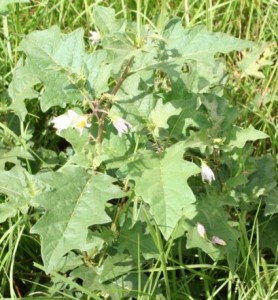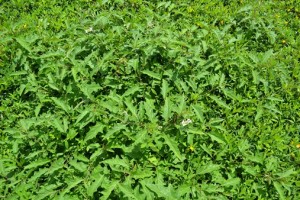Some of Walton County’s perennial peanut producers are experiencing an outbreak of Horsenettles (Solanum carolinense). This pasture weed is also known as love-apple or wild tomato in panhandle Florida, and is toxic to humans and livestock. It is often confused with another serious pasture weed, tropical soda apple, which is in the same Solanum family.
Toxicity varies depending upon plant maturity, environment, and portion of the plant ingested, but all parts are toxic. Even touching the plant can cause irritation.
Acutely poisoned animals can have irritation of the mouth and gastrointestinal lesions. In the chronic form, symptoms include unthriftiness, jaundiced (yellow) mucous membranes, abdominal dropsy, and constipation.
Producers should scout for and control horsenettle in your pastures. Hay producers must be especially cautious not to contaminate bales with this weed.
Horsenettle is an erect perennial weed. The leaves are alternate on the stems, and both leaves and stems contain spines. The leaves on horsenettle can get up to seven inches in length.
There are two ways horsenettle spreads, by its rhizomes and seeds. This plant can be seen with purple to white flowers in clusters on a spiny flower stalk.
This plant can grow in a variety of soil types across the eastern and southeastern United States, however, it grows best in sandy soils and is major weed for producers in the Florida panhandle.
There are a variety of herbicides which will control horsenettle, but the selection depends on which crop the horsenettle is growing in. For more information, download the UF Pasture Weed Control Guide, or contact your local UF/IFAS Extension Office.
Submitted by Mindy Hittle, Walton County Extension Agriculture Agent.
- Be on the Lookout for Pigeon Fever - May 17, 2013
- Managing Fireweed In Pastures - January 11, 2013
- Hay Producers Need to Scout For Horsenettles - August 31, 2012


